Gutters & Gutter Guards
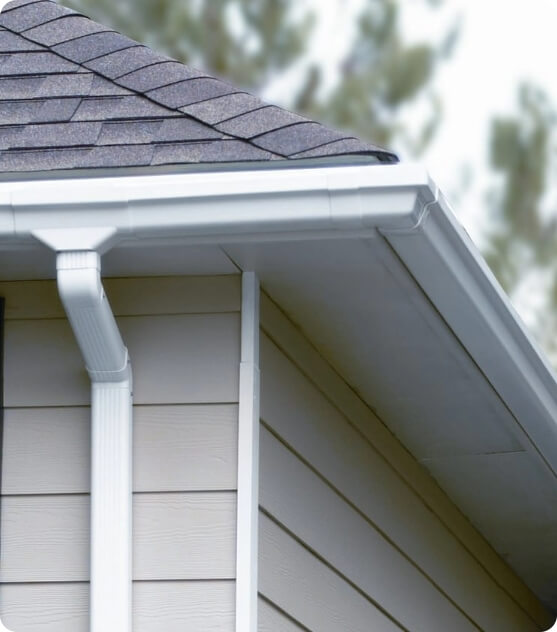
Gutter Repair and Replacement
Gutters aren’t likely to be top of mind for most homeowners. However, they are important in protecting your home from pervasive water damage. In essence, your gutters are the unsung heroes of your home.
Unsurprisingly, water damage can wreak havoc and lead to expensive (and extensive) gutter repair and replacement. Investing in a quality gutter system is one of the best ways to protect your home from water and foundation damage.
With proper installation and routine maintenance, you can feel comfortable knowing your home is protected season after season. The following information will help you understand what gutter systems are, how they work, the types of gutter systems, and the materials used to make them.
How Gutters Work
Gutters are designed to collect and distribute water runoff from your home via interconnected channels. The channels connect to downspouts that redirect water runoff. They guide the water to a safe place, away from your home.
When gutters become clogged with debris, water cannot flow through them and the downspouts cannot redirect the flow. This can lead to overflows and extensive water damage as well as a host of expensive issues including, but not limited to:
- Roof Damage
- Decrease Roof’s Lifespan
- Interior Flooding (e.g., basements, ceilings, interior walls etc.)
- Siding Damage
- Siding Staining
- Soil Erosion and Shifting
- Foundation Damage
- Landscaping Damage
- Mold and Mildew Growth
- Pooling Water (Mosquitoes)
Proper installation, quality materials, gutter repair and replacement help make sure your gutter system works properly. These steps protect your home from water damage.
Benefits of a Quality Gutter System
Outside of directing water away from your home and helping to prevent water damage, there are several additional benefits that a gutter system provides.
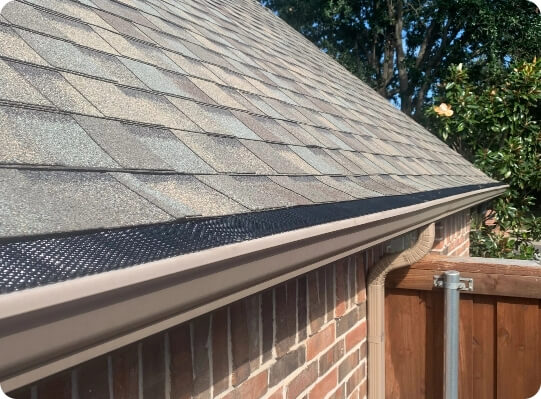
Extends Roof Lifespan
Water is pervasive and can weaken your roof, hence reducing its lifespan. Water can seep beneath the roof’s shingles over time. This encourages the growth of mold and mildew.
This growth leads to damage to the soffit and fascia. Properly installed and well-maintained gutters protect your roof. They help prevent costly repairs or premature replacement.
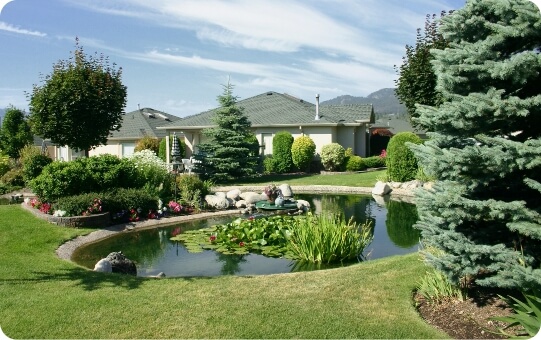
Landscaping
By diverting water away from your house, water is not able to pool or flow in your yard. Water channels can erode the soil’s nutrients, and stagnant water often leads to vegetation root rot. In addition, the stagnant water can become a breeding ground for mosquitoes.
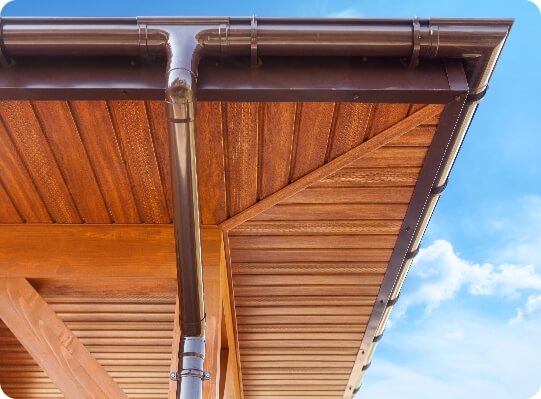
Roof Overhang
Without gutters, the rainwater can create a waterfall effect because there is nowhere else for the water to go. This often causes extensive water damage, flooding, siding damage, and soil erosion. These issues can impact the foundation’s structural integrity.
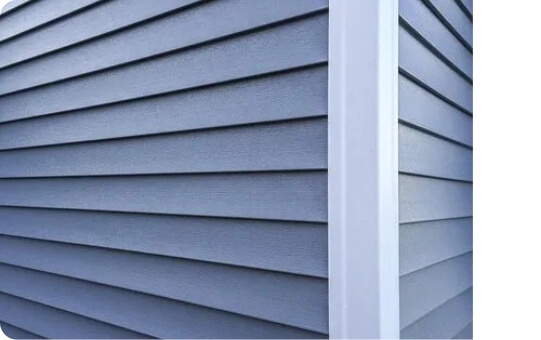
Siding
The siding is not impervious to rot and staining. Gutters that aren’t functioning correctly can damage your home’s siding (mainly wood, stone, and brick).
The water overflow can weaken the siding and encourage the growth of mold and mildew. A properly working gutter system will prevent this from happening.
Gutter Terminology
It’s important to understand how gutter systems work so you can decide whether gutter repair and replacement are best for you and your home. The following gutter terminology should help you understand the main components and the role each plays.
- Downspout (Leaders): The vertical pipe guides the water from the gutter to a drain in the ground. It directs the water safely away from your home or to a downspout elbow.
- Downspout Elbow: The sloped attachment at the base of a downspout helps channel water farther from the home's foundation–preventing pooling and potential damage.
- End Caps: Fit onto the end of each gutter to seal them off.
- Fascia: The flat board that runs horizontally along the roof's edge. They are also used as the foundation to attach the gutters.
- Gutter Guards: A gutter protection system designed to improve the gutters’ performance and longevity. It prevents clogs and the buildup of debris.
- Hanger: A metal bracket is installed onto the fascia board to secure the horizontal gutter components. It prevents the gutters from sagging.
- Mitered Corner: The piece of gutter that fits on the roof’s corner.
- Pitch: The tilted angle of the horizontal section of the gutter that allows the water to flow to a downspout.
- Powder Coating: A dry finishing process generally used in manufacturing to coat/finish aluminum and steel gutters. Powder coating adds durability, reduces UV exposure, and acts as a barrier to corrosive elements.
- Seams: The space where individual gutter components connect. You must apply a gutter sealant regularly to prevent the seams from leaking. At Honey-Do-Men, we only install seamless gutters.
- Section: The unit of measurement for each gutter.
Types Of Gutter Systems
Given their importance and their role, choosing the right system for gutter repair and replacement can be confusing. Fortunately, you don’t have to do it alone. Honey-Do-Men offers various gutter repair and replacement options to fit every home, style, and budget. You can keep your home safe under any weather condition with our services.
There are two types of gutter systems: seamed (sectional) and seamless:
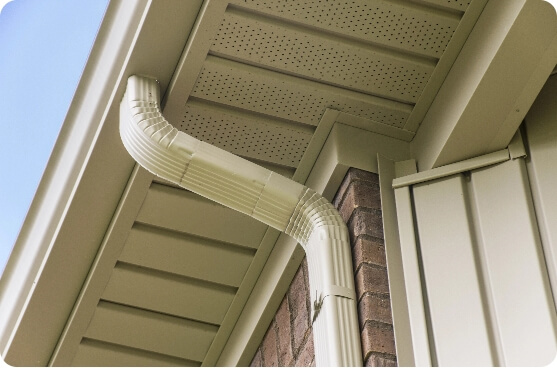
Seamed (Sectional) Gutters
Sectional gutters are pieced together from pre-cut sections. The sections are affixed to the home’s fascia with hangers.
Pros:
- Budget Friendly
- Repairable (if one section is damaged, that section can be repaired or replaced)
Cons:
- Requires Sealant (to prevent the seams from leaking)
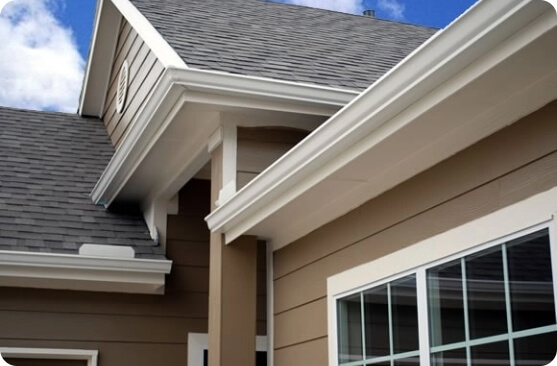
Seamless Gutters
As the name implies, seamless gutters are manufactured as a single piece to create a smooth, uniform (seamless) appearance. Seamless gutters are very resistant to leaks. They attach directly to the fascia board for maximum durability.
Since the gutters are customized and measured specifically for your home, we create them on-site. Seamless gutters offer a sleek, contemporary look that seamed gutters can't replicate.
Pros:
- Aesthetics
- Great Water Flow
- Secure (attached to the fascia board)
- Resistant to Leaks
- Custom Measurement/Fit
Cons:
- Made On-Site
- Specialized Installation
Gutter Styles
In general, gutter systems are available in three different styles/options. Each has its advantages and disadvantages, and each provides various functionality.
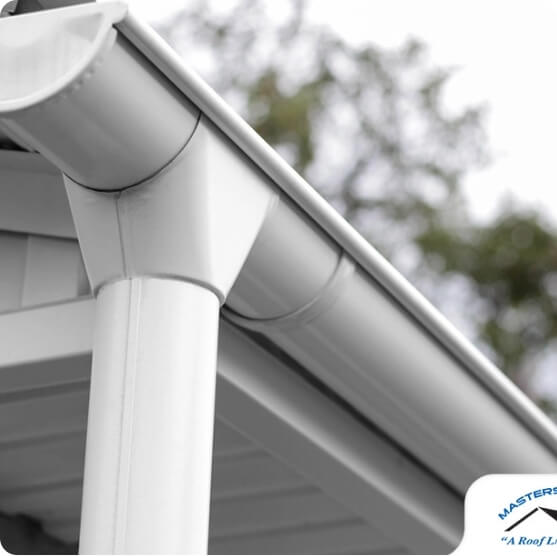
Half Round (U-Shaped) Gutters
Traditional gutter systems generally have a u-shaped (semi-circular) appearance with a curved lip and rounded downspouts. They have gained popularity because they are low maintenance. The larger diameter and smooth interior make it easier for water to flow.
The smooth interior makes half round gutters less corrosion-prone and more efficient than other gutter styles. Once installed, half round gutters require very little maintenance. Half round gutters can be easily paired with a gutter protection system, such as gutter guards for even more protection.
Pros:
- Traditional/Classic Look
- Durable
- Less Prone to Corrosion
- Efficient Water Flow
- Low Maintenance
Cons:
- Expensive
- Prone to Wind Damage
- Prone to Debris Accumulation (without a gutter protection system)
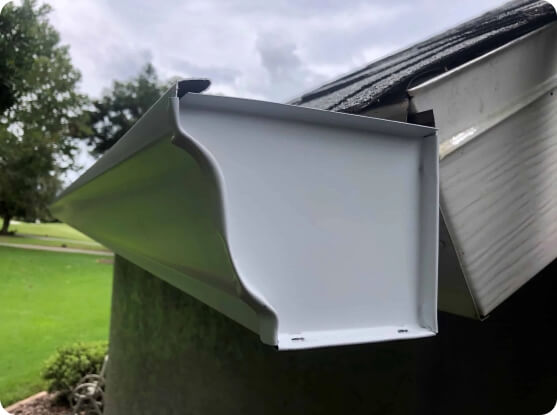
K-Style Gutters
K-style gutters are popular because they’re wider and can carry more water, making them efficient. They attach directly to the fascia boards using hidden hangers. They eliminate the need for brackets.
However, their angular shape and rectangular downspouts can clog with leaves and debris. This can lead to mold and mildew growth. Pairing the system with gutter guards can help prevent this.
Pros:
- Budget Friendly
- Easily Customized
- Water Flow
- Durable
- Sturdy (no brackets required)
Cons:
- High Maintenance
- Prone to Clogging
- Difficult to Clean (because of the angular shape)
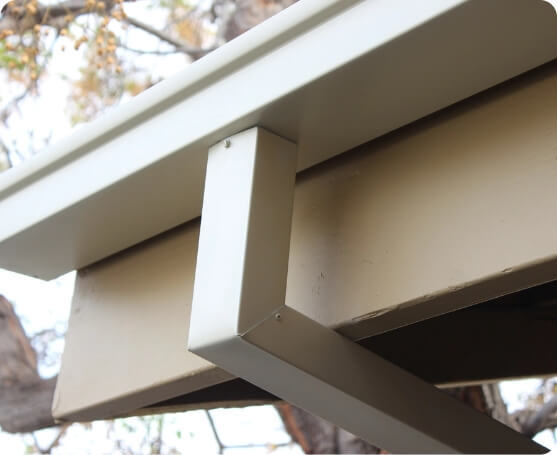
Box-Style Gutters
Box-style gutters are generally found on large commercial or multi-family residential buildings. They are designed to withstand heavy rainfall and melting snow.
Their large size and heavy weight require a roof large enough to hold them and must be professionally installed. Instead of being hung on the edge of the roof, box-style gutters are installed under the roof’s shingles.
Pros:
- Very Durable
- Efficient
- Water Flow
Cons:
- Expensive
- Heavy
- Potential Roof Damage
- Lacks Curb Appeal
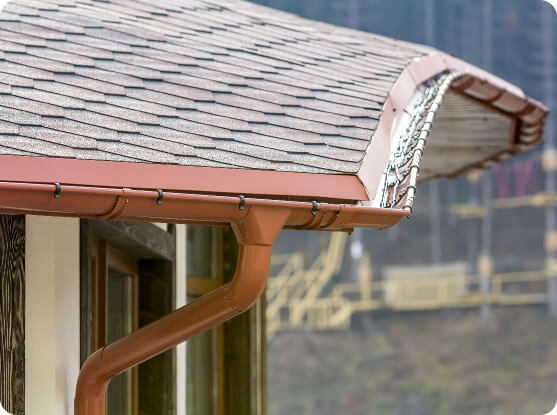
Yankee Gutters
Yankee gutters—built-in gutters or integral gutters—are an architectural feature of houses popular in the Northeast. Instead of being attached to a home's exterior, these gutters are built into the roof or eaves of the house.
Pros:
- Aesthetic Appeal
- Increased Durability
- Lower Maintenance
- Ice Prevention
Cons:
- Expensive
- Limited Functionality
- Accessibility
- Limited Repair Options
Gutter System Materials
There are several types of gutter system materials to choose from. Each gutter material has its own benefits. However, if your gutter system isn’t installed correctly, even the most durable material can fail. This might lead to costly gutter repair and replacement.
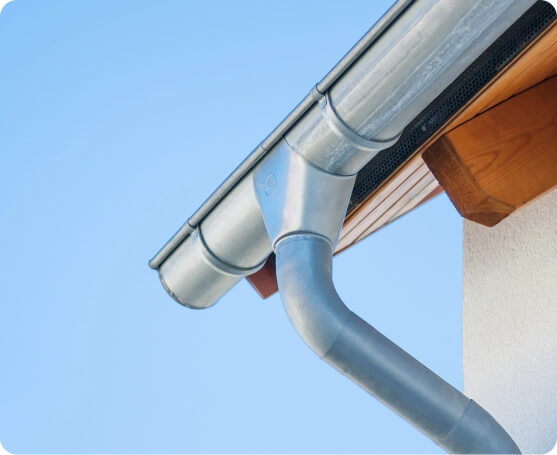
Aluminum
Aluminum gutter systems must be powder coated in manufacturing to provide added durability and aesthetic appeal. Since powder coatings contain no solvents, little or no VOCs (Volatile Organic Compounds) are released into the air during the process. Aluminum gutter systems can last 20-30 years with proper care and maintenance.
Pros:
- Rust Resistant
- Lightweight
- Versatile (can be customized to match your home’s exterior)
- Variety of Designs/Styles
Cons:
- Prone to Damage
- Can Dent/Crack
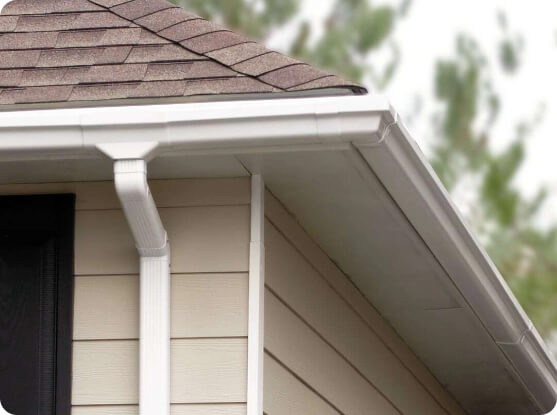
Vinyl
Vinyl is a popular material used to produce gutters because it’s inexpensive and is generally water resistant. Depending on care and maintenance, vinyl gutters can last 10-20 years.
Pros:
- Budget Friendly
- Water Resistant
Cons:
- Heavy
- Can Stain Fascia Boards
- Prone to Cracks and warping (in extreme temperatures)
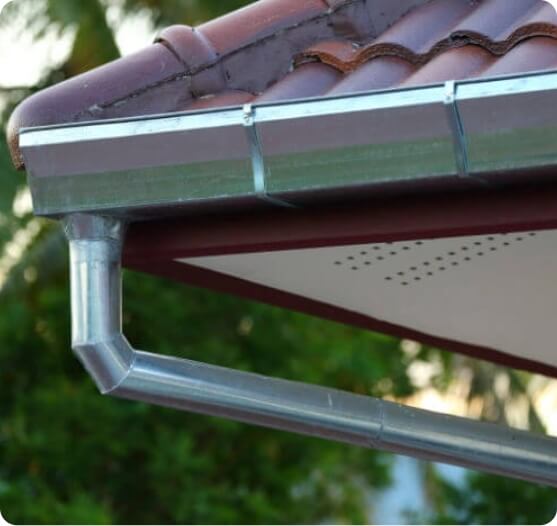
Steel
Steel gutter systems must be powder coated in manufacturing for durability and aesthetic appeal. Powder coatings contain no solvents. As a result, little or no VOCs (Volatile Organic Compounds) are released into the air during the process.
Steel gutter systems must be soldered during installation. Hence, it is important to use a professional gutter installation specialist like Honey-Do-Men. With proper care and maintenance, steel gutter systems can last 20-30 years.
Pros:
- Very Durable (can withstand heavy rain and snow)
- Rust Resistant (when maintained)
- Dent Resistant
Cons:
- Expensive
- Specialized Installation
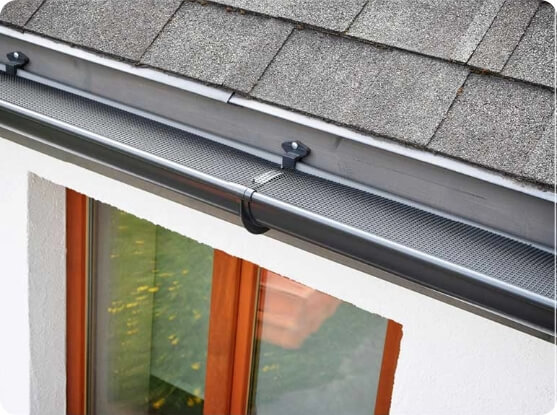
Zinc
Zinc is considered a premium gutter system material and one of the easiest to maintain. Zinc systems offer inherent durability. They allow homeowners to avoid gutter repair or replacement costs when appropriately maintained. Once professionally installed, zinc gutter systems can last up to 80 years.
Pros:
- Premium Material
- Highly Durable
- Low Maintenance
- Long-Lasting
- Self-Sealing Patina (helps prevent scratches/dents/cracks)
- Aesthetic Appeal
Cons:
- Expensive
- Specialized Installation
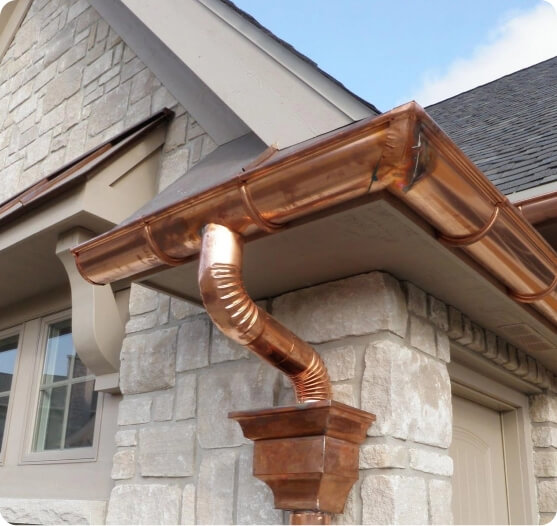
Copper
Copper is a top-of-the-line premium gutter system material. It has traditionally been used to make residential water pipes. However, copper has been increasingly used to create gutter systems because copper is naturally resistant to water and fluctuating temperatures.
Copper does not require a finishing coat and looks beautiful on its own. As the most durable gutter system material, copper gutters can last over 100 years if properly installed and maintained.
Pros:
- Top Premium Material
- Aesthetic Appeal
- Very Durable
- Long Lasting
- Resistant to Fluctuating Temperatures
- Rust Resistant
- Does Not Require Finishing
- Won’t Warp/Bend
Cons:
- Expensive
- Specialized Installation
Considerations
Ultimately, the durability of your gutter system depends on various factors. These factors include installation, materials used, and level of maintenance.
However, there are other considerations to consider before deciding which type of gutter system is best for your home.
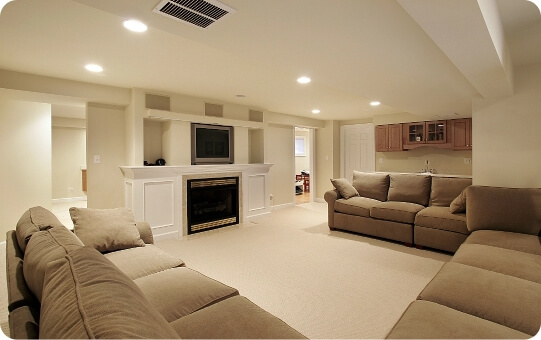
Basements
When rainwater seeps into a home because of improper drainage, it can compromise the entire foundation and lead to mold growth. Homes with basements are especially prone to water damage. Proper gutter system installation, high-quality materials, and routine maintenance are required for maximum protection.
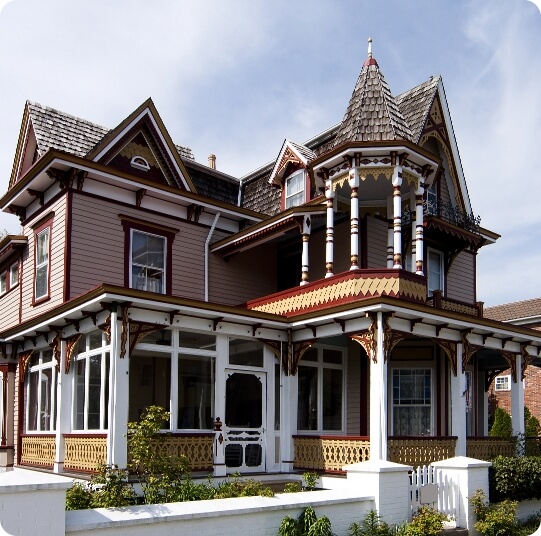
Historic Homes
Historical homes—especially those listed on the National Register of Historic Places—likely require specific gutter systems, materials, and installation. If you live in or are considering purchasing a historic home, it’s important to comply with all local ordinances.
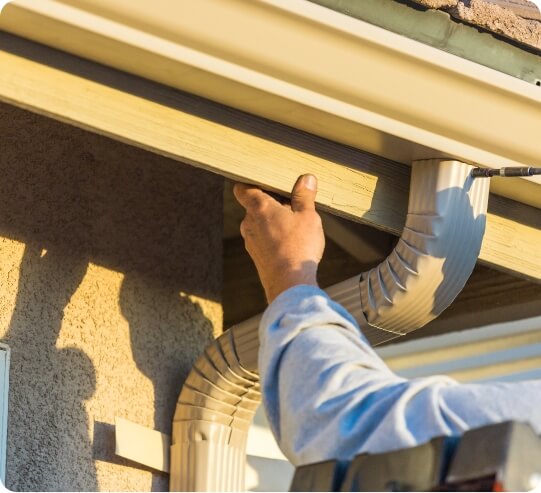
Gutter Installation
Gutter installation requires specialized skills, tools, and precise measurements. With little room for error, proper installation is key to protecting your home. The risk of injury from slips and falls also makes it important to hire a trained professional like Honey-Do-Men.
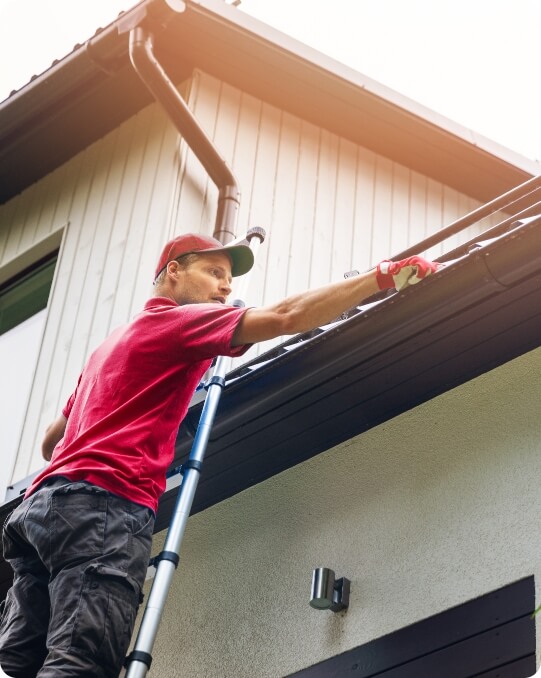
Gutter Maintenance
Routine maintenance is key to keeping your gutter system in good condition. This includes checking for damage, clearing debris, and ensuring proper water flow away from your home’s foundation.
Neglecting maintenance can lead to costly gutter repair and replacement due to water damage. Understanding the maintenance needs of your gutter system helps you make the best decision. Installing gutter guards can significantly reduce maintenance by preventing debris buildup.
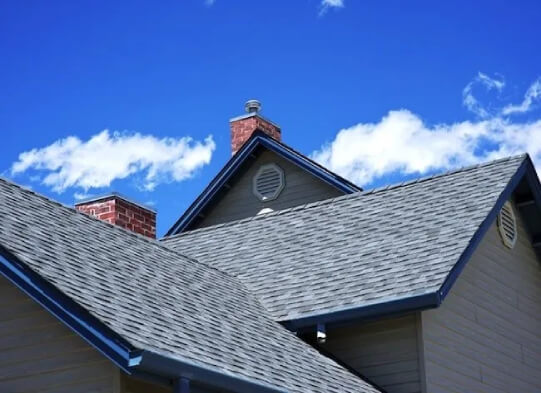
Sloped Lots
Homes situated on a hilly or sloped lot require a quality gutter system because the soil around the home will eventually erode. Soil erosion can lead to severe structural damage to your home’s foundation.
If your home has multiple slopes, a quality gutter system will help facilitate proper drainage away from your home, prevent water from pooling in the yard, and make sure your home is protected from the water damage that often occurs without a properly functioning gutter system.
GUTTER GUARDS
Cleaning gutters may not be glamorous. However, it’s necessary to protect your home in any weather. While gutters direct water from your home, they’re prone to clogs. Clogged gutters can cause costly roof leaks, soil erosion, and foundation damage. They can help keep gutters free of debris so that your system works properly.Benefits Of Gutter Guards
Installing a gutter protection system is typically based on the long-term benefits versus the upfront expense. Outside of preventing leaves and debris from clogging your gutter system, there are many benefits to installing a gutter protection system.
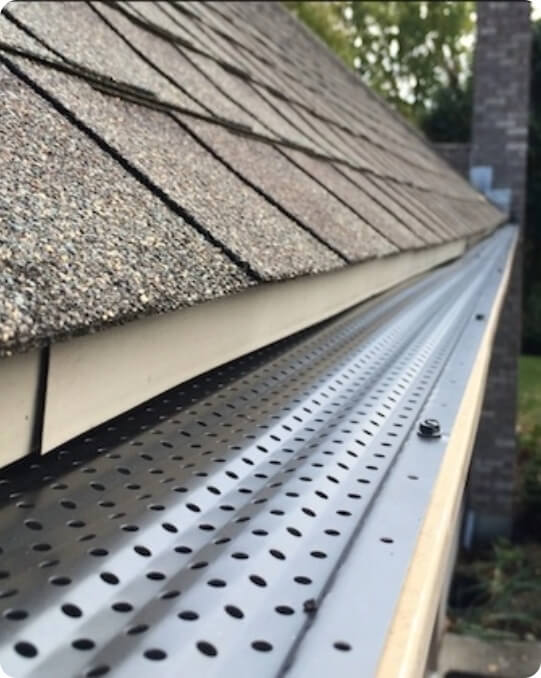
Reduces Gutter Cleaning Frequency
People install gutter protection systems to save time, energy, and money on gutter cleaning. Gutter systems should be cleaned at least twice a year for proper maintenance. Nevertheless, gutter guards protect against clogs and debris year-round.
While they reduce cleaning frequency, you must maintain them as small items like twigs and pine needles can accumulate. Overall, gutter guards significantly reduce the amount of maintenance required.
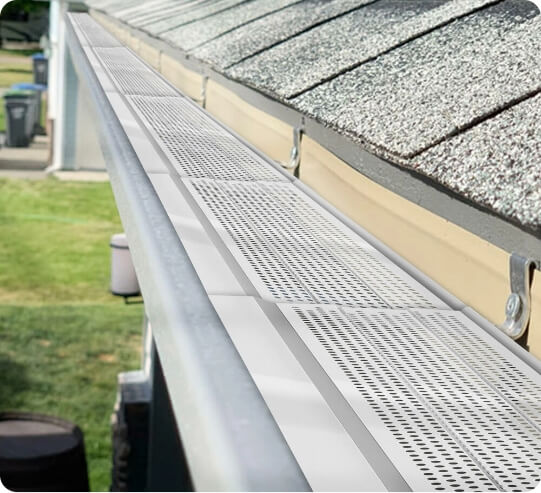
Affordable Gutters
There are many types of gutter protection systems available. Although they come with upfront costs, many homeowners find that gutter guards pay for themselves by eliminating the need for regular cleanings.
Additionally, most gutter guards can be installed over properly functioning gutters. This way, you won’t need to replace your entire system.
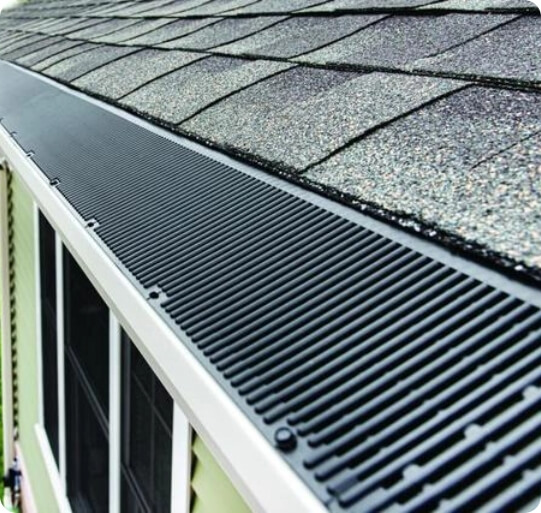
Extends Gutter System Lifespan
Gutters are a common nesting spot for pests. However, gutter guards create a barrier that keeps birds, snakes, and rodents out.
Clogged gutters can also cause water to pool, creating a breeding ground for mosquitoes. If not maintained, the weight of clogged gutters can cause them to sag or even fall off. This leaves your home vulnerable to water damage that requires immediate attention.
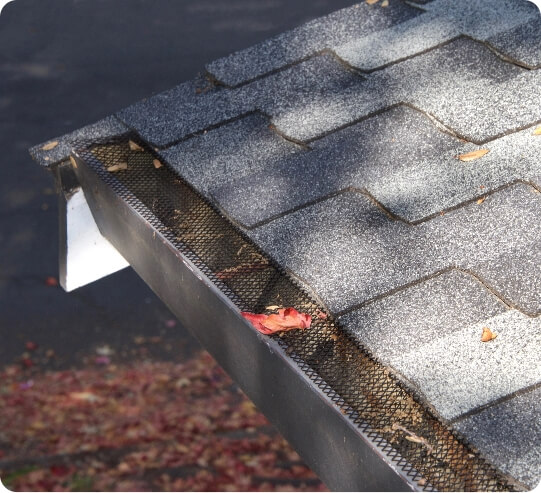
Pest Control
Gutters are a familiar nesting spot for pests. However, gutter guards prevent birds, snakes, and rodents from settling in. Clogged gutters can also cause water to pool and create a breeding ground for mosquitoes.
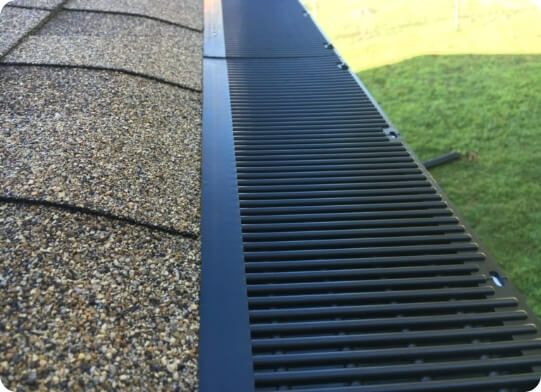
Discourages Mold/Mildew Growth
Since gutters often become clogged by leaves and debris, the decomposition can lead to the growth of mold, mildew and other organic materials. When these things flourish (especially in humid conditions), they can damage the roof and cause health issues.
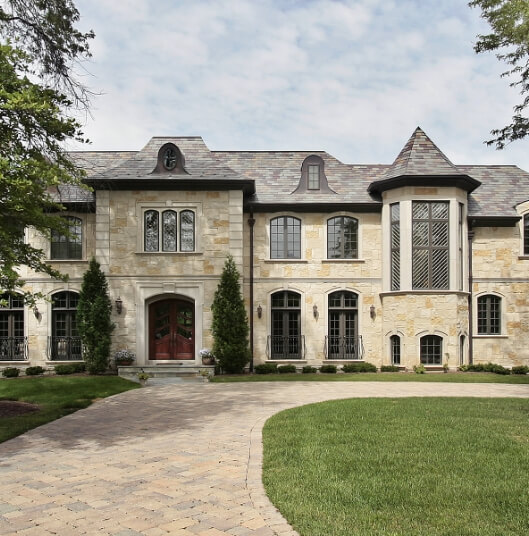
Gutter Safety
Gutter guards eliminate the need for cleaning. This significantly reduces the risk of personal injury, especially for homeowners who clean their gutters. Falling from ladders or slipping on roofs are common causes of serious injuries.
Types Of Gutter Guards
There are a variety of gutter guard options available. Honey Do Men offers a variety of gutter guard options to fit every home and budget to keep your home safe under any weather condition.
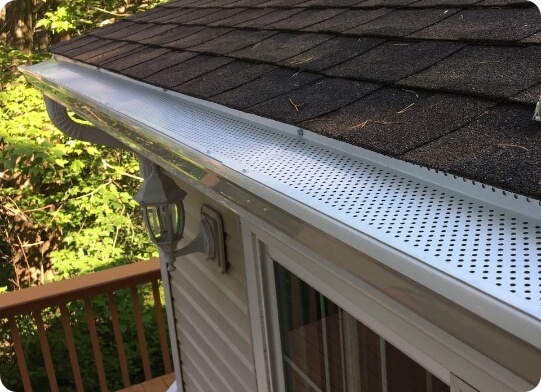
Types Of Gutter Guards
There are a variety of gutter guard options available. Honey-Do-Men offers a variety of gutter guard options to fit every home and budget. These options help keep your home safe under any weather condition.
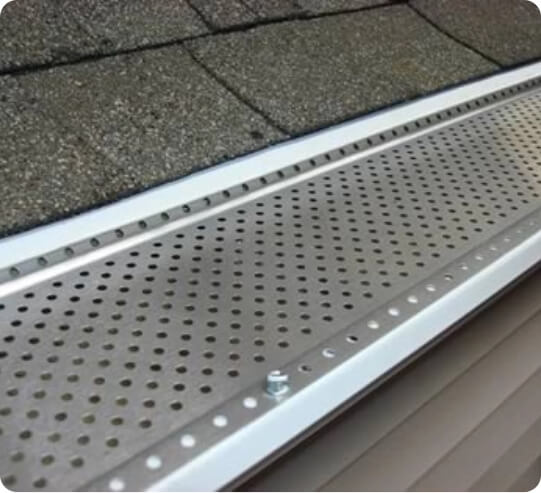
Shur Flo
Shur Flo is a perforated aluminum gutter guard that provides a practical, low-maintenance solution. We install it on top of gutters with zip screws for stability and durability. The system comes with a 25-year, no-clog warranty, and we recommend cleaning it every 10-15 years.
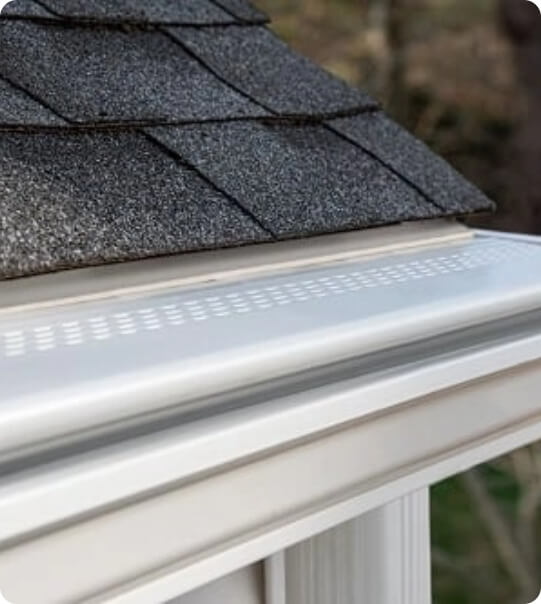
Leaf Tech
LeafTech gutter guards feature a built-in hood and louver that work together to keep gutters clear of clogs. We install the louvers under your roof’s shingles to slow and filter most of the water flow. The hood then allows the remaining water to flow through invisible holes at the base.
The LeafTech clip design diverts water, keeping dirt and debris from staining the gutters. With a lifetime warranty, these guards never need cleaning again.
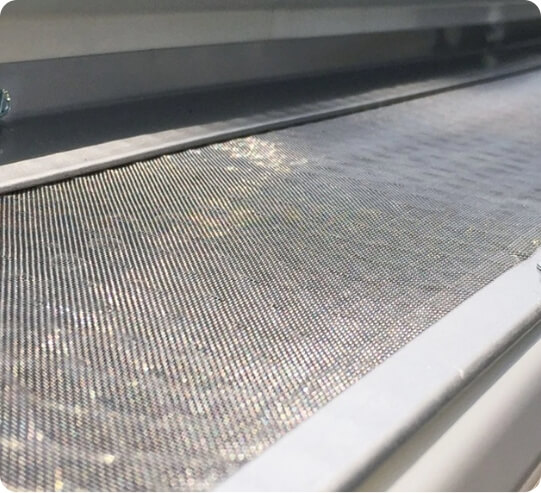
Xtreme Gutter Guards
XTreme gutter guards use a stainless steel micro-mesh to prevent small particles—like pine needles—from clogging gutters.
Unlike other covers that can weigh down the system and cause sagging, XTreme guards use a patented hemming process to keep the mesh tight. Your gutters can stay clean for life with our lifetime warranty.
Why Choose Us for Gutter Repair and Replacement?
Honey-Do-Men offers top-quality gutter systems for your home’s needs. Need a gutter repair and replacement, or added protection with gutter guards? Our team delivers craftsmanship with efficiency.
Beyond gutters, we also offer roofing, siding, windows, and exterior maintenance services to keep your home in top shape. If your gutters are clogged, leaking, or outdated, don’t wait for costly damage to occur.
Call us today at (914) 837-0411 for a thorough assessment. Find out how we can help protect your home from water-related issues.
TESTIMONIALWhat Our Customers Say About Us
Common Gutters & Gutter Guards Questions
Installing gutter guards offers several benefits:
- Debris Prevention: Gutter guards help prevent leaves, twigs, and other debris from clogging your gutters, which can lead to water overflow and damage to your home’s foundation and roof.
- Reduced Maintenance: They significantly reduce the frequency of gutter cleaning, saving time and effort for homeowners.
- Pest Control: Gutter guards deter pests such as rodents, birds, and insects from nesting in your gutters.
- Prolonged Gutter Life: By preventing debris buildup and standing water, gutter guards can extend the life of your gutters by reducing the risk of rust and corrosion.
To Schedule A Complimentary Consultation With One Of Our Specialists
Give us a call today.
Contact Us
